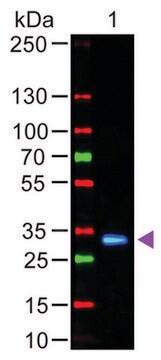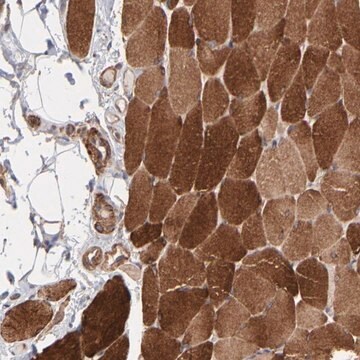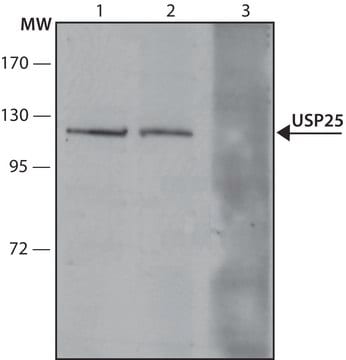추천 제품
생물학적 소스
rabbit
Quality Level
재조합
expressed in proprietary host
결합
unconjugated
항체 형태
affinity isolated antibody
항체 생산 유형
primary antibodies
클론
SP115, monoclonal
종 반응성
mouse (tested)
종 반응성(상동성에 의해 예측)
rat
기술
immunohistochemistry: 1:100
동형
IgG
배송 상태
wet ice
저장 온도
2-8°C
타겟 번역 후 변형
unmodified
유전자 정보
human ... ADGRE1(2015)
일반 설명
EMR1 (egf-like module containing, mucin-like, hormone receptor-like 1) is a human homolog of F4/80, an eosinophil-specific receptor. It is abundantly expressed on leukocytes. F4/80 is a member of the GPCR superfamily. It has N-terminal EGF (epidermal growth factor)-like domains bound to a seven-span transmembrane (7TM) moiety through a mucin-like spacer domain. This gene is located on human chromosome 19p13.
Mouse EGF-like module-containing mucin-like hormone receptor-like 1 (EMR1) or cell surface glycoprotein F4/80 is a cell surface glycoprotein and a member of the EGF TM7 family of proteins. It shares 68% overall amino acid identity with human EGF-module-containing-mucin-like hormone receptor 1 (EMR1). Expression of F4/80 is heterogeneous and is reported to vary during macrophage maturation and activation. The F4/80 antigen is expressed on a wide range of mature tissue macrophages including Kupffer cells, Langerhans, microglia, macrophages located in the gut lamina propria, peritoneal cavity, lung, thymus, bone marrow stroma and macrophages in the red pulp of the spleen. F4/80 expression has also been reported on a subpopulation of dendritic cells but is absent from macrophages located in T cell areas of the spleen and lymph node. The ligands and biological functions of the F4/80 antigen have not yet been determined but recent studies suggest a role for F4/80 in the generation of efferent CD8+ regulatory T cells.
면역원
Synthetic peptide derived from N-terminus of mouse F4/80 protein.
애플리케이션
Anti-F4/80 antibody has been used in immunohistochemistry.
생화학적/생리학적 작용
In liquid bone marrow cultures, F4/80/EMR1 (egf-like module containing, mucin-like, hormone receptor-like 1) acts as a maturation marker for mononuclear phagocytes. EMR1 can be used as a target molecule in the treatment of individuals suffering from squamous cell carcinoma and eosinophilic disorders.
특징 및 장점
Evaluate our antibodies with complete peace of mind. If the antibody does not perform in your application, we will issue a full credit or replacement antibody. Learn more.
물리적 형태
0.1 ml rabbit monoclonal antibody purified by protein A/G in PBS/1% BSA buffer pH 7.6 with less than 0.1% sodium azide.
면책조항
Unless otherwise stated in our catalog or other company documentation accompanying the product(s), our products are intended for research use only and are not to be used for any other purpose, which includes but is not limited to, unauthorized commercial uses, in vitro diagnostic uses, ex vivo or in vivo therapeutic uses or any type of consumption or application to humans or animals.
적합한 제품을 찾을 수 없으신가요?
당사의 제품 선택기 도구.을(를) 시도해 보세요.
Storage Class Code
10 - Combustible liquids
WGK
WGK 2
Flash Point (°F)
Not applicable
Flash Point (°C)
Not applicable
시험 성적서(COA)
제품의 로트/배치 번호를 입력하여 시험 성적서(COA)을 검색하십시오. 로트 및 배치 번호는 제품 라벨에 있는 ‘로트’ 또는 ‘배치’라는 용어 뒤에서 찾을 수 있습니다.
Human EMR2, a novel EGF-TM7 molecule on chromosome 19p13.1, is closely related to CD97
Lin HH, et al.
Genomics, 67(2), 188-200 (2000)
Comparative evaluation of eosinophils in normal mucosa, dysplastic mucosa and oral squamous cell carcinoma with hematoxylin-eosin, Congo red, and EMR1 immunohistochemical staining techniques
Kargahi N, et al.
Electron Physician, 7(2), 1019-1026 (2015)
Western diet enhances benzo(a)pyrene-induced colon tumorigenesis in a polyposis in rat coli (PIRC) rat model of colon cancer
Harris KL, et al.
Oncotarget, 7(20), 28947-28960 (2016)
EMR1, the human homolog of F4/80, is an eosinophil-specific receptor
Hamann J, et al.
European Journal of Immunology, 37(10), 2797-2802 (2007)
Kelly L Harris et al.
Oncotarget, 7(20), 28947-28960 (2016-03-10)
Consumption of Western diet (WD), contaminated with environmental toxicants, has been implicated as one of the risk factors for sporadic colon cancer. Our earlier studies using a mouse model revealed that compared to unsaturated dietary fat, the saturated dietary fat
자사의 과학자팀은 생명 과학, 재료 과학, 화학 합성, 크로마토그래피, 분석 및 기타 많은 영역을 포함한 모든 과학 분야에 경험이 있습니다..
고객지원팀으로 연락바랍니다.








